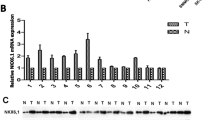Abstract
Casein kinase 1 epsilon (CK1ε) is a member of the casein kinase 1 (CK1) family, which comprises highly conserved and ubiquitous serine/threonine protein kinases. Recent studies have demonstrated that CK1ε plays a role in human cancers; however, the role of CK1ε in hepatocellular carcinoma (HCC) remains unclear. The study used immunohistochemistry to examine CK1ε expression in 230 HCC specimens by tissue microarray (TMA) and assessed the effect of CK1ε knockdown on migration of human hepatoma cells in vitro. The immunohistochemical analyses showed that low CK1ε expression was significantly correlated with tumor differentiation (p = 0.008), T classification (p = 0.016), tumor vascular invasion (p = 0.002), and cancer stage (p = 0.010). The univariate and multivariate analyses showed that patients with low CK1ε expression had a considerably lower OS rate than that of the patients with high CK1ε expression (p = 0.041, hazard ratio = 1.4; p = 0.039, hazard ratio = 1.4). Moreover, CK1ε small interfering RNA (siRNA) treatment exerted an invasion-promoting effect in human hepatoma cells. In conclusion, our data indicated that low CK1ε expression is correlated with a low survival rate and CK1ε may play a role as a tumor suppressor in hepatocarcinogenesis.



Similar content being viewed by others
References
Mittal S, El-Serag HB. Epidemiology of hepatocellular carcinoma: consider the population. J Clin Gastroenterol. 2013;47(Suppl):S2–6.
Fares N, Peron JM. Epidemiology, natural history, and risk factors of hepatocellular carcinoma. La Revue du Praticien. 2013;63:216–7. 220–212.
Guthle M, Dollinger MM. Epidemiology and risk factors of hepatocellular carcinoma. Radiologe. 2014;54:654–9.
Sherman M. Hepatocellular carcinoma: epidemiology, risk factors, and screening. Semin Liver Dis. 2005;25:143–54.
Zhou XD. Recurrence and metastasis of hepatocellular carcinoma: progress and prospects. Hepatobiliary Pancreat Dis Int: HBPD INT. 2002;1:35–41.
Dhanasekaran R, Limaye A, Cabrera R. Hepatocellular carcinoma: current trends in worldwide epidemiology, risk factors, diagnosis, and therapeutics. Hepatic Med: Evid Res. 2012;4:19–37.
Kane RC, Farrell AT, Madabushi R, et al. Sorafenib for the treatment of unresectable hepatocellular carcinoma. Oncologist. 2009;14:95–100.
Cheong JK, Virshup DM. Casein kinase 1: complexity in the family. Int J Biochem Cell Biol. 2011;43:465–9.
Knippschild U, Gocht A, Wolff S, Huber N, Lohler J, Stoter M. The casein kinase 1 family: participation in multiple cellular processes in eukaryotes. Cell Signal. 2005;17:675–89.
Gross SD, Anderson RA. Casein kinase 1: spatial organization and positioning of a multifunctional protein kinase family. Cell Signal. 1998;10:699–711.
Huang Y, Li J, Wu L, et al. Association between a casein kinase 1 epsilon gene polymorphism and schizophrenia in a Chinese Han population. J Mol Neurosci: MN. 2012;47:470–4.
Flajolet M, He G, Heiman M, Lin A, Nairn AC, Greengard P. Regulation of Alzheimer’s disease amyloid-beta formation by casein kinase 1. Proc Natl Acad Sci U S A. 2007;104:4159–64.
Ghoshal N, Smiley JF, DeMaggio AJ, et al. A new molecular link between the fibrillar and granulovacuolar lesions of Alzheimer’s disease. Am J Pathol. 1999;155:1163–72.
Frierson Jr HF, El-Naggar AK, Welsh JB, et al. Large scale molecular analysis identifies genes with altered expression in salivary adenoid cystic carcinoma. Am J Pathol. 2002;161:1315–23.
Polakis P. The many ways of Wnt in cancer. Curr Opin Genet Dev. 2007;17:45–51.
Peters JM, McKay RM, McKay JP, Graff JM. Casein kinase 1 transduces Wnt signals. Nature. 1999;401:345–50.
Brockschmidt C, Hirner H, Huber N, et al. Anti-apoptotic and growth-stimulatory functions of CK1 delta and epsilon in ductal adenocarcinoma of the pancreas are inhibited by IC261 in vitro and in vivo. Gut. 2008;57:799–806.
Foldynova-Trantirkova S, Sekyrova P, Tmejova K, et al. Breast cancer-specific mutations in ck1epsilon inhibit Wnt/beta-catenin and activate the Wnt/Rac1/JNK and NFAT pathways to decrease cell adhesion and promote cell migration. Breast Cancer Res: BCR. 2010;12:R30.
Modak C, Bryant P. Casein kinase 1 epsilon positively regulates the Akt pathway in breast cancer cell lines. Biochem Biophys Res Commun. 2008;368:801–7.
Kim SY, Dunn IF, Firestein R, et al. CK1epsilon is required for breast cancers dependent on beta-catenin activity. PLoS One. 2010;5, e8979.
Hsu CM, Lin SF, Lu CT, Lin PM, Yang MY. Altered expression of circadian clock genes in head and neck squamous cell carcinoma. Tumour Biol: J Int Soc Oncodev Biol Med. 2012;33:149–55.
Richter J, Ullah K, Xu P, Alscher V, Blatz A, Peifer C, et al. Effects of altered expression and activity levels of CK1delta and varepsilon on tumor growth and survival of colorectal cancer patients. Int J Cancer J Int du Cancer. 2015;136:2799–810.
Rodriguez N, Yang J, Hasselblatt K, et al. Casein kinase 1 epsilon interacts with mitochondrial proteins for the growth and survival of human ovarian cancer cells. EMBO Mol Med. 2012;4:952–63.
Lin SH, Lin YM, Yeh CM, et al. Casein kinase 1 epsilon expression predicts poorer prognosis in low t-stage oral cancer patients. Int J Mol Sci. 2014;15:2876–91.
Teufel A, Staib F, Kanzler S, et al. Genetics of hepatocellular carcinoma. World J Gastroenterol: WJG. 2007;13:2271–82.
Schittek B, Sinnberg T. Biological functions of casein kinase 1 isoforms and putative roles in tumorigenesis. Mol Cancer. 2014;13:231.
Relles D, SendeCK J, Chipitsyna G, Hyslop T, Yeo CJ, Arafat HA. Circadian gene expression and clinicopathologic correlates in pancreatic cancer. J Gastrointest Surg: Off J Soc Surg Aliment Tract. 2013;17:443–50.
Yang WS, Stockwell BR. Inhibition of casein kinase 1-epsilon induces cancer-cell-selective, period2-dependent growth arrest. Genome Biol. 2008;9:R92.
Knippschild U, Kruger M, Richter J, et al. The CK1 family: contribution to cellular stress response and its role in carcinogenesis. Front Oncol. 2014;4:96.
Acknowledgments
This study was supported by a research grant from Changhua Christian Hospital, Taiwan.
Author information
Authors and Affiliations
Corresponding authors
Ethics declarations
Conflicts of interest
None
Additional information
Shu-Hui Lin and Chung-Min Yeh contributed equally to this work.
Rights and permissions
About this article
Cite this article
Lin, SH., Yeh, CM., Hsieh, MJ. et al. Low cytoplasmic casein kinase 1 epsilon expression predicts poor prognosis in patients with hepatocellular carcinoma. Tumor Biol. 37, 3997–4005 (2016). https://doi.org/10.1007/s13277-015-4225-1
Received:
Accepted:
Published:
Issue Date:
DOI: https://doi.org/10.1007/s13277-015-4225-1




